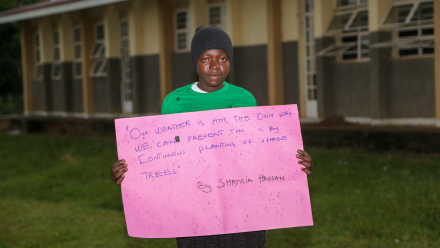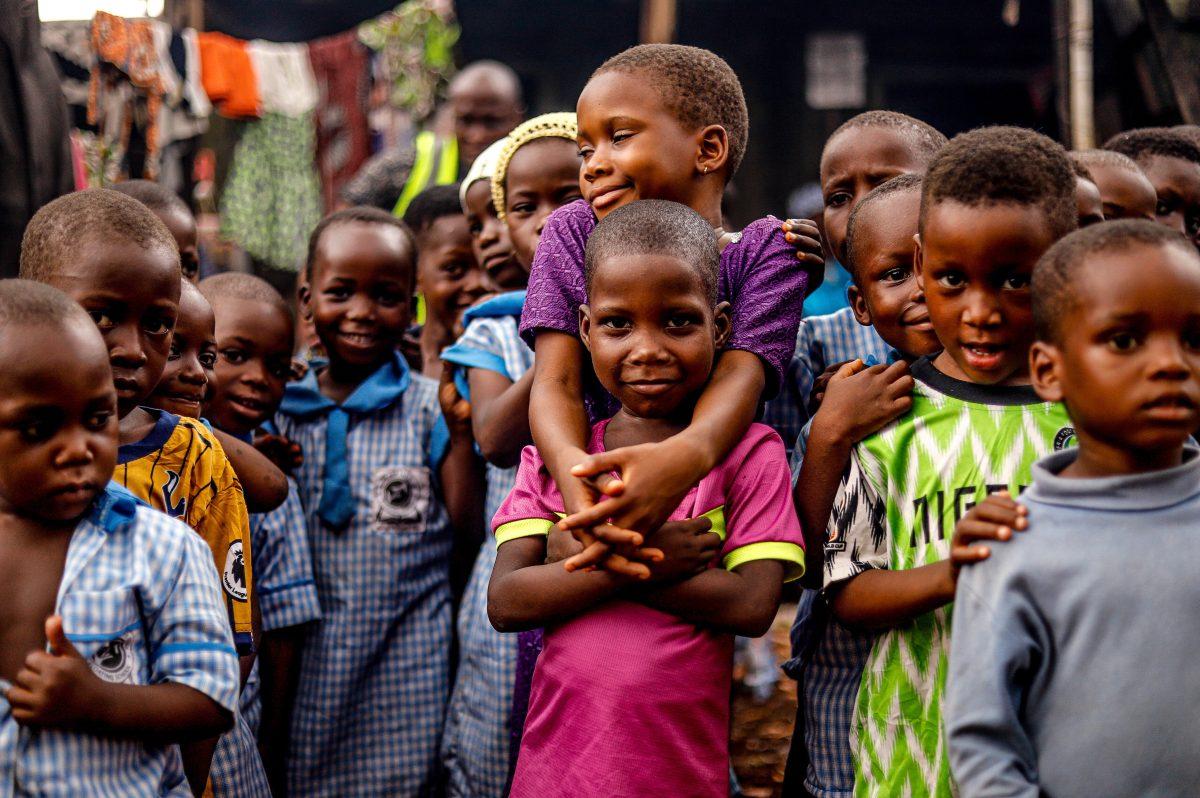A long time ago in Parikile village, we lived with my father. He was called Karim. My father married my mother. She was called Shamia. She was heavy with a child. Unfortunately, my mother died as she gave birth to a beautiful baby girl. My father named her Aida. Soon afterwards my father married again and his new wife gave birth to another girl called Shamira. Aida and Shamira grew up together. They played and worked together. They went to the well and to the forest to collect firewood together. The two sisters loved each other so much and were inseparable.
Aida my sister grew up to be a very beautiful girl. She was so beautiful that the birds sang and praised her beauty wherever she went. All the young men wished they could marry her. Many men said that even if she put her feet in a dish of soup, they would happily drink that soup. Whenever she went to the well, many young men would hide in a nearby bush and peep through the grass just to have a close look at her.
Shamira on the other hand was very ugly. She was said to be extremely ugly and it was known that she would frighten even a sheep. When the sheep saw Shamira, they broke loose from their rope and ran away in fright. Her bad looks were the talk of the village. The young men of the village disliked her because she was ugly. Shamira’s mother, my step mother was unhappy because her daughter was ugly; for she envied Aida’s beauty that she wanted her dead. She spent many sleepless nights thinking of a way to get rid of Aida and at last she one day found a way.
One morning, she got banana fibres and sticks from her garden, and started weaving two strong baskets. Every day she would call Aida and Shamira and ask them to sit in the baskets. By doing this, she got to know which size of basket she needed to cover up Aida. When the basket was ready and big enough for Aida to sit in, she hid it somewhere far away. A few weeks later, the village was attacked by an army from a nearby village. The village chief sent for all the strong men in the village leading them to fight the enemy. My father was among the men who went to fight. The war went on for weeks and so my father did not come home. When father had gone away, Shamira’s mother called the two girls to her hut. She then sent the two girls on an errand. However she sent Shamira to a friend who lived far away. She told both the girls that she would give the girl who came back first some sweet pan cakes.
Aida loved pan cakes very much, when she heard of the offer, she came back home faster. Shamira’s mother called her and told her to sit in one of the baskets. She very quickly covered poor Aida and tied it up with banana fibres. She lifted the basket and took it to a faraway forest called Mombo. She then put the basket up in a big and tall tree. The tree near the village well. Shamira’s mother then went back home and waited for Shamira to come back home, for she knew Shamira loved Aida so very much that she would ask her where she was. She thought of a lie to tell her.
When Shamira came back, her mother gave her two pan cakes for her to eat. After sometime, Shamira began feeling lonely. “Mother, where is my sister Aida?” she asked. “Silly girl, don’t disturb me with your questions,” Shamira’s mother shouted and reminded her that she was only a child and should not therefore ask her parents too many questions. She promised her a good beating if she asked any more question. For fear of being beaten, Shamira kept quiet and did not ask any question again. But with every passing day, she became very sad and lonely. She did not talk to her mother. She had no one to play with and she missed Aida so much. Aida was her only sister and friend and she meant so much to her. Many times when she thought about Aida, she ended up crying. “Why are you crying, what is wrong with you?” her mother would ask. But Shamira never answered her.
One day, Shamira’s mother sent her to fetch water at the well near Mombo forest. When Shamira arrived at the well, she knelt down and dipped her pot in to the water. As she was lifting the pot she heard a voice singing.
Shamira! Shamira!
Tell those at home for me that Aida the dark skinned one was killed
Aida the beautiful one was killed
Aida was hated
She was killed
Shamira, tell those at home for me that Aida is in the forest of Mombo
Aida….
Shamira was shocked; she suddenly stopped drawing water and attentively listened to the singing voice. She tried to look around for she could not find out where the voice came from. So she put the pot of water on her head and went back home. When she got home, she didn’t tell my stepmother about what she heard. Every time she went to the well, she heard the voice but still could not trace where it came from. After some time, my father came back alive and well from the war. Shamira saw him first as she was sitting in the courtyard thinking of Aida. She jumped with joy when she saw him and ran to welcome him back home. Her mother too went to welcome him.
Later during the day, my dad asked for Aida. Shamira’s mother said; “ever since Karim accompanied the villagers for war, Aida also disappeared.” However, Shamira told the father that whenever she went to fetch water at the well, she would hear a song that goes;
Shamira! Shamira!
Tell those at home for me that Aida the dark skinned one was killed
Aida the beautiful one was killed
Aida was hated
She was killed
Shamira, tell those at home for me that Aida is in the forest of Mombo
Aida….
My asked Shamira to take him to the well where she usually heard the song, Shamira took my dad to well and they both listened to the song. It was on this ground that they mobilized people and searched for Aida. Only to find her remains in the basket that Shamira’s mother weaved. Shamira recognized the basket and told her father that it was her mother who wove the basket.



